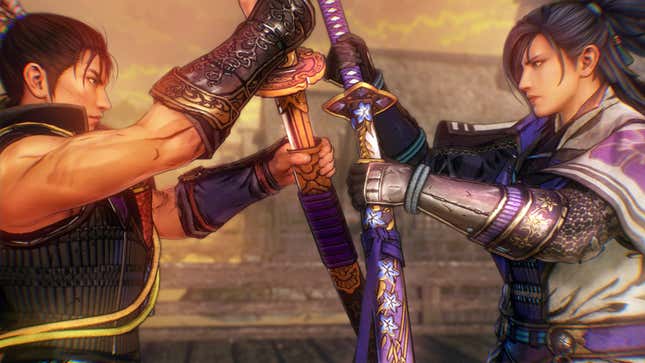
Musou games—the large-scale hack-and-slash games typified by series like Dynasty Warriors—often get a bad wrap, with detractors arguing that they’re just monotonous power fantasies lacking in depth. While there’s some truth to that, such a reductive reading misses the point behind games in this genre, which still has millions of ardent fans despite evolving little since its PlayStation origins. Clearly it’s doing something right, and although not everyone appreciates these games, I’m grateful that their distinctive musou magic helped me bond with my cousin as we wreaked havoc across historical battlefields.
Read More: Fire Emblem Warriors Was Brilliant Actually: A Defense Of Musou
Sometimes called “Warriors” games here in the U.S., these third-person action-RPG hack-and-slash titles all largely function the same. If you’ve played 1997's Dynasty Warriors or 2004's Samurai Warriors, then you know exactly how 2020's Hyrule Warriors: Age of Calamity or 2022's Fire Emblem Warriors: Three Hopes plays—especially since they’re all made by Japanese studios Koei Tecmo and Omega Force. You select a character and cut through an assortment of battlefields, wrecking everyone in sight on a warpath to total domination while leveling up, unlocking moves, and grabbing equipment. It’s a familiar gameplay loop that grows rote across Tecmo Force’s catalog, but it’s also a cozy experience that my cousin and I thoroughly enjoyed growing up.
My cousin, about two years younger than myself, is on the autism spectrum. In particular, his dyslexia makes gaming a challenge, as parsing the intricacies and nuances of game mechanics can be a frustrating experience for him. It’s certainly not impossible; he’s beaten FromSoftware’s Dark Souls trilogy much faster than I ever did, partly because he’s far more stubborn than I am, but picking up any game requires a constant recalibration in his brain, one that takes much longer than most of us experience after simply being away from a game for a little while. There have been countless times where I’ve watched him restart a game due to the exasperation he felt over forgetting where to go or how things worked, something that’s always left me hurting for him. Warriors games, for us, don’t have this issue, primarily because they’re all basically identical to one another.
Take our favorite of these games, 2006's Samurai Warriors 2. Mostly focusing on the Battle of Sekigahara during Japan’s Sengoku period, we’d pick our fave generals—the demon king Nobunaga Oda for my cousin, his faithful retainer Mitsuhide Akechi for myself—and absolutely fuck shit up. Locking ourselves in my bedroom in my grandma’s home, one of those transparent PS2 controllers in each of our hands as the chunky CRTV illuminated our faces, we’d demolish every single battlefield for hours on end. It didn’t matter that our characters were maxed out. It didn’t matter that the nameless warriors and wimpy generals stood no chance against us. Hell, it didn’t matter that we had beaten the game several times over. Because at the end of the day, we were simply enamored with the game’s power fantasy. In our shared experience, the simplicity and approachability of mowing down hundreds of random and important dudes, the very thing so many people attack the genre for, became its greatest feature.
That power fantasy, for us, has always been the selling point of Musou games. Nevermind that split-screen local co-op is usually an option in these kinds of titles. It was always the 1vs1000 mythos that we bought into, especially considering how flashy the Warriors franchise has become with the likes of 2021's Samurai Warriors 5. These games are the perfect embodiment of “gaming as escapism,” transporting us to the historical settings of feudal Japan to see a not-so-historical version of how famous figures vied for ultimate control of the Land of the Rising Sun. It usually ends in tragedy, but being able to experience history through an interactive medium gave us a much deeper fascination with and understanding of Japanese culture, something we both appreciate to this day.
Read More: I Miss Smashing Gears Of War In One Weekend With My Bestie
I still play Musou games all the time. In fact, One Piece Pirate Warriors 4 is always installed on my PlayStation, ready for me to cut down thousands of hapless goons on my quest to be the strongest warrior. I just wish my cousin, who I left behind in California, was by my side to experience it with me. He’s such a big One Piece fan that I know he would love playing as Luffy or Zoro.